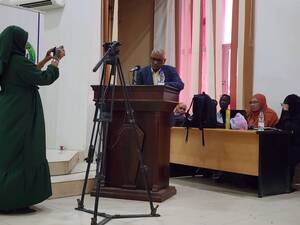Training Tomorrow’s Agri-experts in Sudan

5th of March 2023- Wad Madani, Gezira Station, Sudan
CGIAR and Sudan’s Agricultural Research Coorportation (ARC) conducted a capacity development session on good agronomic practices and participatory research for sustainable intensification as part of CGIAR’s Fragility to Resilience (F2R)-CWANA Initiative. Thirty-two trainees from ARC, the University of Gezira, and FAO attended the session representing different disciplines vital to building climate resilience in farmers’ food production approaches, such as soil, water, agronomy, and climate-smart crop breeding (wheat, groundnut, sorghum, cotton).
In Sudan, agriculture contributes 38% of the total GDP, 70% of the labor force, 80% of the non-oil export, and 80% of the population depends on agriculture for their livelihoods. The research program in the country has been organized in four thematic areas: sustainable crop production, natural resources management, agricultural socioeconomic, and policy analysis, and knowledge management and up-scaling.

The training presented the latest and free statistical data analysis software that helps better inform scientists of the progress and impact of their research. The session was facilitated by Dr. Amani Idris (F2R-CWANA Sudan Focal person for Agronomic activities) and Dr. Hala Mohamed Mustafa Elamein. The session was led by Dr. Krishna Devkota (Manager, Sustainable Intensification Work package of F2R-CWANA). The session also featured presentations on topics that are important for the countries of the attending scientists, such as best agronomic practices for wheat, cotton, sorghum, and groundnut and scale-appropriate machinery, sustainable water management, and sustainable soil management required for sustainable intensification.
The training also presented a comprehensive outlook on the country’s research priorities by bundling agronomic practices. Such trainings at different levels throughout the value chain, including extensionists, university professors, students, private sector input suppliers, leaders, commercial farmers, farmer co-operatives, and individual farmers' is necessary to realize the impact in food production and marketing at scale.
